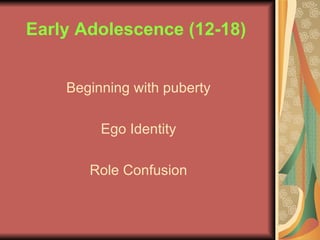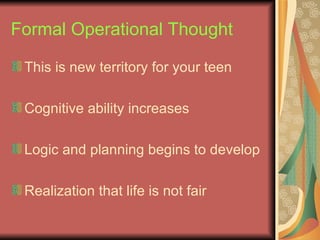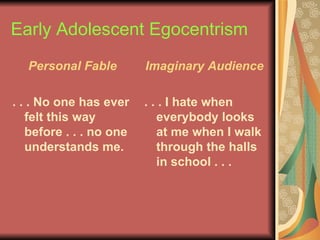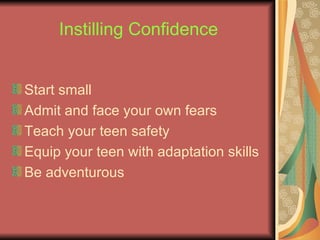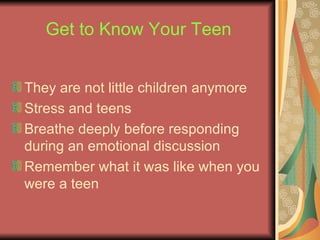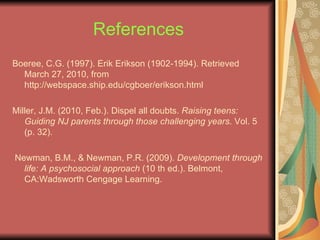Bridging The Gap Between Parents And Teens
- 1. Bridging the Gap Between Parents and Teens . . . Yes, it is Possible! Presenter: Colleen Duffy Young Graduate Student Seton Hall University
- 2. Early Adolescence (12-18) Beginning with puberty Ego Identity Role Confusion
- 3. Blame it on the Brain Parent: What were you thinking?? Teen: I donŌĆÖt know . . . (. . . and guess what, they really donŌĆÖt know . . . )
- 4. Formal Operational Thought This is new territory for your teen Cognitive ability increases Logic and planning begins to develop Realization that life is not fair
- 5. Early Adolescent Egocentrism Personal Fable . . . No one has ever felt this way before . . . no one understands me. Imaginary Audience . . . I hate when everybody looks at me when I walk through the halls in school . . .
- 6. Instilling Confidence Start small Admit and face your own fears Teach your teen safety Equip your teen with adaptation skills Be adventurous
- 7. Get to Know Your Teen They are not little children anymore Stress and teens Breathe deeply before responding during an emotional discussion Remember what it was like when you were a teen
- 8. Please DonŌĆÖt Embarrass Me! Kisses and hugs LOL ŌĆō yo dawg! Shopping DonŌĆÖt wear their clothes Follow-up for details on phone calls Conspicuous behavior Be a chaperone Photo op ŌĆ” remember when you were 5 and . . .
- 9. Conclusion When you least want to give your teen a hug, is probably the time that he or she needs one the most !
- 10. References Boeree, C.G. (1997). Erik Erikson (1902-1994). Retrieved March 27, 2010, from http://webspace.ship.edu/cgboer/erikson.html Miller, J.M. (2010, Feb.). Dispel all doubts. Raising teens: Guiding NJ parents through those challenging years . Vol. 5 (p. 32). Newman, B.M., & Newman, P.R. (2009). Development through life: A psychosocial approach (10 th ed.). Belmont, CA:Wadsworth Cengage Learning.
Editor's Notes
- #2: Good evening everyone. I want to thank all of you for coming to this informal meeting to discuss your roles as parents to your teen son or daughter. I chose to speak to the parents of students in the 7 th and 8 th grade because you and your teen will be, if you havenŌĆÖt already, embarking on a journey that can be challenging for the family. Having a keen understanding of the many changes that your child is experiencing is key in knowing how to bridge the gap between you and your teen, or preferably in not allowing the gap to occur at all. With that being said, I would like to continue with this presentation. At the end of the presentation, we will have a 10 minute break. I will be available to field questions when you return. I will be handing out brochures to everyone at the conclusion of the question-taking.
- #3: Some physiological changes during puberty are easily recognized in young men and women between the ages of 12 to 18. Sexual characteristics include breast development, pubic hair, and menarche ┬Āin girls; deepening of the voice, facial, chest, and pubic hair in boys, and acne from clogged oil and sweat glands in both (Newman & Newman, 2009). Physiological changes also encompass "interrelated neurological and endocrinological changes that influence" changes in mood, thoughts, energy, and in sleep patterns (Newman & Newman, 2009, p. 319). The egocentrism that results during a transition from one developmental stage to another begins to fade when the teens thought processes become more flexible and developed (Newman & Newman, 2009). The decentering experienced by the adolescent happens when he or she discovers that not everyone has the same ideals as him or her (Newman & Newman, 2009). Adolescents experience more pressures in life than younger children. Society expects more from them, school is harder, social structures can set them up for rejection (sports, clubs, and the like) and they are more aware of what other people are experiencing. Ego identity ŌĆ£means knowing who you are, and how you fit in to the rest of societyŌĆØ (Boeree, 1997, para. 58). Your teen will take everything that he or she has learned about life, including the self, and he or she will combine everything into his or her own self-image. We can help our teens avoid role confusion by providing them with healthy adult interaction, good adult role models, and by keeping communication open (Boeree, 1997). ŌĆ£Without these things, we are likely to see role confusion, meaning an uncertainty about oneŌĆÖs place in society and the worldŌĆØ (Boeree, 1997). According to Erik Erikson (1902-1994) a psychologist, and Pulitzer Prize and national Book Award winner for GandhiŌĆÖs Truth , ŌĆ£[w]hen an adolescent is confronted by role confusion . . . he or she is suffering from an identity crisisŌĆØ (Boeree, 1997, para. 62).
- #4: The human brain experiences cortical development in the prefrontal cortex during this period of life. According to Newman & Newman (2009), the front lobe begins to develop during this period and continues until the person reaches his or her mid-20s. Consequently, judgment, reasoning and learning from experience, among other advances, are not fully formed until he or she is approximately 25. All adults in a teens life should be aware of limitations of teens, parents, teachers, coaches, and other adults in his or her life. This is the stage where teens develop serious negative self-esteem issues because more is expected from them than they are capable of achieving. When I think of a parent asking their teen son or daughter why he or she did something unacceptable and they respond, "I don't know," they are probably telling the truth, because their judgment, ability to think ahead, and impulse control has not been developed in the prefrontal cortex. Once the prefrontal cortex is fully formed, cognitive ability is referred to as executive functioning (Newman & Newman, 2009).
- #5: There are six skills that emerge during the development of formal operational thought . The first skill involves the "ability to mentally manipulate more than two categories" at the same time (Newman & Newman, 2009). As an example, adolescents can cognitively understand and describe reasons why people behave the way in which they do. The second skill is the ability for them to look into the future and imagine events that may change, such as losing a grandparent (Newman & Newman, 2009). The third skill involves the ability of teens to logically order events by foreseeing themselves going to college, getting a job, and the like (Newman & Newman, 2009). The fourth ability is in the realization that consequences exist for their behavior (Newman & Newman, 2009). If they want to steal a candy bar, for instance, they realize that if they are caught they would be in serious trouble. The fifth skill learned during formal operational thought is the capacity to discern inconsistencies (Newman & Newman, 2009). An example of this skill is when they discover that elected officials may promise change, yet not follow through on promises. In essence, they learn that the world is not equal, nor fair to all people at all times. The sixth and final example of the new conceptual skills that teens learn is what is considered normal behavior within their culture (Newman & Newman, 2009).
- #6: Early adolescent egocentrism consists of two characteristics, personal fable and imaginary audience (Newman & Newman, 2009). Personal fable is the belief that their intense thoughts and feelings are unique to them and that other people are unable to understand what they are experiencing (Newman & Newman, 2009). Imaginary audience is a thought process that causes teens to feel uncomfortable, self-conscious, and awkward while involved in personal interaction. Teens imagine that everyone around them is more involved in the teen's thoughts than in their own (Newman & Newman, 2009).
- #7: As teens begin to move away from you, allow for their space while they learn about the world. By helping them to become independent, you are preparing both you and your teen for longer period from each other, for instance, moving to college, moving out of the house eventually, or studying abroad. As parents we worry about the safety of our children. We must not pass this on to them, however, because they will absorb your ŌĆ£fears, just like [he or] she absorbs your values and sense of humorŌĆØ (Miller, 2010, p. 32). Allowing our teens freedom helps him or her to become more confident in his or her decision-making skills. Teens need to realize that evil does exist in this world. By talking with your teen about possible bad-case scenarios, you will be helping him or her to be equipped with skills in how to handle themselves if found in a bad situation. Talk about cars, drugs, alcohol, anything that your teen will be faced with. Our teens should also be told to always be aware of their surroundings. Try to engage your teen in activities that you both enjoy and challenge yourselves whether it is a new sport (skiing), a new sporting event (hockey), hiking, or anything that you think you would both enjoy.
- #8: Timing is everything! Learn to identify the best times to have conversations with your teen and give him or her space. Realize that teens suffer from stress and be aware of danger signs. I have listed some things to be aware of in my brochure that I will be handing out after the presentation. Try to keep a level head, even if your teen is not able to. It is better to walk away and revisit a discussion than to have a heated argument. No one wins. Be respectful and understanding of his or her struggles, and remember when you were a teen.
- #9: Your teen doesnŌĆÖt want you to be his or her ŌĆ£friend,ŌĆØ they want you to be their parent. Some things that parents do around their teens in an innocent manner, can have a lasting negative effect on them. Remember personal fable and the imaginary audience. Ask your teen how he or she feels about kisses and hugs in public. DonŌĆÖt try to talk teen slang, it isnŌĆÖt becoming. Let the teen choose their clothing. DonŌĆÖt model yourself after your teen. DonŌĆÖt intrude in your teenŌĆÖs phone or email conversations (unless you believe your teen is in danger). When in public, donŌĆÖt call attention to yourself or your teen by acting inappropriately. Give your teen some space, let another adult volunteer chaperone social events. Keep the camera at home, or limit your photos in public DonŌĆÖt tell childhood stories about your teen to their friends or other people Try to remember what it was like to be a teenager.
- #10: We will now take a short recess of 10 minutes. When you return, I will attempt to answer any questions you may have. Copies of this presentation, and a brochure on ways to help your teen, will be passed around when you return to your seats. You have been a great audience. Thank you!

